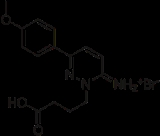
Gabazine
Encyclopedia
Gabazine is a drug
that acts as an antagonist
at GABAA receptor
s. It is used in scientific research and has no role in medicine, as it would be expected to produce convulsions if used in humans.
Gabazine binds to the GABA recognition site of the receptor-channel complex and acts as an allosteric inhibitor
of channel opening. The net effect is to reduce GABA-mediated synaptic
inhibition by inhibiting chloride
flux across the cell membrane, and thus inhibiting neuronal hyperpolarization. While phasic (synaptic) inhibition is gabazine-sensitive, tonic (extrasynaptic) inhibition is relatively gabazine-insensitive.
Drug
A drug, broadly speaking, is any substance that, when absorbed into the body of a living organism, alters normal bodily function. There is no single, precise definition, as there are different meanings in drug control law, government regulations, medicine, and colloquial usage.In pharmacology, a...
that acts as an antagonist
Receptor antagonist
A receptor antagonist is a type of receptor ligand or drug that does not provoke a biological response itself upon binding to a receptor, but blocks or dampens agonist-mediated responses...
at GABAA receptor
Receptor (biochemistry)
In biochemistry, a receptor is a molecule found on the surface of a cell, which receives specific chemical signals from neighbouring cells or the wider environment within an organism...
s. It is used in scientific research and has no role in medicine, as it would be expected to produce convulsions if used in humans.
Gabazine binds to the GABA recognition site of the receptor-channel complex and acts as an allosteric inhibitor
Allosteric regulation
In biochemistry, allosteric regulation is the regulation of an enzyme or other protein by binding an effector molecule at the protein's allosteric site . Effectors that enhance the protein's activity are referred to as allosteric activators, whereas those that decrease the protein's activity are...
of channel opening. The net effect is to reduce GABA-mediated synaptic
Chemical synapse
Chemical synapses are specialized junctions through which neurons signal to each other and to non-neuronal cells such as those in muscles or glands. Chemical synapses allow neurons to form circuits within the central nervous system. They are crucial to the biological computations that underlie...
inhibition by inhibiting chloride
Chloride
The chloride ion is formed when the element chlorine, a halogen, picks up one electron to form an anion Cl−. The salts of hydrochloric acid HCl contain chloride ions and can also be called chlorides. The chloride ion, and its salts such as sodium chloride, are very soluble in water...
flux across the cell membrane, and thus inhibiting neuronal hyperpolarization. While phasic (synaptic) inhibition is gabazine-sensitive, tonic (extrasynaptic) inhibition is relatively gabazine-insensitive.

